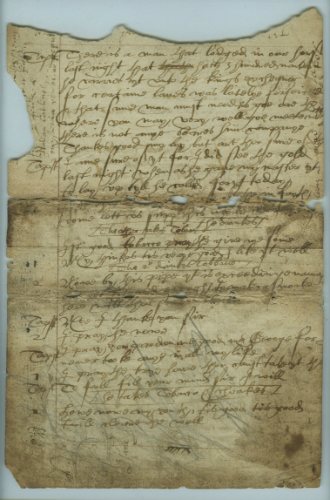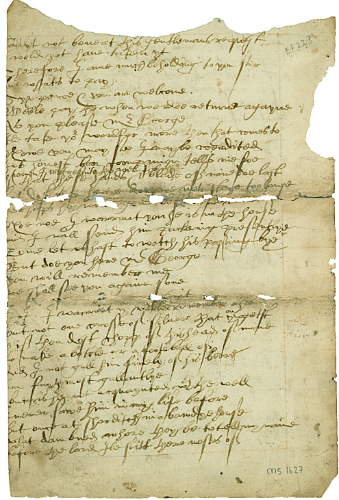Play of Thieves and a Gullible Tapster: Difference between revisions
mNo edit summary |
mNo edit summary |
||
| Line 21: | Line 21: | ||
<br> | <br> | ||
===Transcription=== | ===Transcription=== | ||
The following transcription is derived from Freeman's in conjunction with fresh readings of the digitised fragment above. | |||
<br> | <br> | ||
<br> | <br> | ||
<blockquote> | |||
<table style="width:60%;white-space:nowrap;"> | |||
<tr><td>'''[recto]''' </td><td></td><td></td><td> </td></tr> | |||
<tr><td>Tapst </td><td>There is a man that lodged in our house</td><td></td><td> </td></tr> | |||
<tr><td></td><td>last night that <strike>thath</strike> hath 3 hundred markes in [ ]</td><td></td><td> </td></tr> | |||
<tr><td></td><td>he carries yt vnto the kings exchequer</td><td></td><td> </td></tr> | |||
<tr><td></td><td>for certaine lands was latelye forfeited</td><td></td><td> </td></tr> | |||
<tr><td></td><td>& that same man must needes go ore the [ ]</td><td></td><td> </td></tr> | |||
<tr><td></td><td>where you may very well goe meete w<sup>th</sup> [ ]</td><td></td><td> </td></tr> | |||
<tr><td></td><td>there is not anye beares him companye</td><td></td><td> </td></tr> | |||
<tr><td>2 </td><td>Thankes good my boy but art thou sure of th[ ]</td><td></td><td> </td></tr> | |||
<tr><td>Tapst </td><td>I ame sure of yt for I did see the gold</td><td></td><td> </td></tr> | |||
<tr><td></td><td>last night when as he gaue my master yt</td><td></td><td> </td></tr> | |||
<tr><td></td><td>to lay vp tyll he calld for yt today</td><td></td><td> </td></tr> | |||
<tr><td>2 </td><td>[ ] of the in fayth</td><td></td><td> </td></tr> | |||
<tr><td></td><td>comm lett us supp this licour [ ]</td><td></td><td> </td></tr> | |||
<tr><td></td><td> '''he drinkes'''</td><td></td><td></td></tr> | |||
<tr><td></td><td> '''The other takes Tobac'''</td><td></td><td> </td></tr> | |||
<tr><td></td><td>Ist good tobacco pray the guie me some</td><td></td><td> </td></tr> | |||
<tr><td>1 </td><td>My thinkes tis verye good I like yt well</td><td></td><td> </td></tr> | |||
<tr><td></td><td> '''The 2<sup>d</sup> drinkes Tobbacco'''</td><td></td><td> </td></tr> | |||
<tr><td>2 </td><td>Now by this pipe yt is exceedinge maing[ ]</td><td></td><td> </td></tr> | |||
<tr><td></td><td>but yet tis good enough to make a smoake</td><td></td><td> </td></tr> | |||
<tr><td></td><td>here wilt thou some Tobacco</td><td></td><td> </td></tr> | |||
<tr><td>Tapst </td><td>Noe I thanke you sir</td><td></td><td> </td></tr> | |||
<tr><td>2 </td><td>I praye the nowe</td><td></td><td> </td></tr> | |||
<tr><td>Tapst </td><td>I pray you pardon me good m<sup>r</sup> George for [I]</td><td></td><td> </td></tr> | |||
<tr><td></td><td>neuer tooke anye in all my life</td><td></td><td> </td></tr> | |||
<tr><td>1 </td><td>I pray the trye howe thou canst take yt th[ ]</td><td></td><td> </td></tr> | |||
<tr><td>Tapst </td><td>To full fill your mind sir I will</td><td></td><td> </td></tr> | |||
<tr><td></td><td> '''he takes Tobacco & choakes'''</td><td></td><td> </td></tr> | |||
<tr><td>2 </td><td>Howe nowe my youth, tis good tis good</td><td></td><td> </td></tr> | |||
<tr><td></td><td>twill cleare the well</td><td></td><td> </td></tr> | |||
</table> | |||
</blockquote> | |||
<br> | <br> | ||
<br> | <br> | ||
Revision as of 19:21, 19 May 2016
Anon. (c.1605?)
NB. "Play of Thieves and a Gullible Tapster" is a recent assignation (from Wiggins 1470) for this untitled play. The name is used here for convenience.
Historical Records
Schøyen MS 1627
A fragment preserved in the binding of a copy of the 1586 Geneva edition of Homer's Odyssey was found by Patrick King in 1988. It is now MS 1627 in the Schøyen Collection in Oslo:

|

|
| Schøyen MS 1627, recto © The Schøyen Collection, Oslo and London |
Schøyen MS 1627, verso © The Schøyen Collection, Oslo and London |
Transcription
The following transcription is derived from Freeman's in conjunction with fresh readings of the digitised fragment above.
[recto] Tapst There is a man that lodged in our house last night that thathhath 3 hundred markes in [ ]he carries yt vnto the kings exchequer for certaine lands was latelye forfeited & that same man must needes go ore the [ ] where you may very well goe meete wth [ ] there is not anye beares him companye 2 Thankes good my boy but art thou sure of th[ ] Tapst I ame sure of yt for I did see the gold last night when as he gaue my master yt to lay vp tyll he calld for yt today 2 [ ] of the in fayth comm lett us supp this licour [ ] he drinkes The other takes Tobac Ist good tobacco pray the guie me some 1 My thinkes tis verye good I like yt well The 2d drinkes Tobbacco 2 Now by this pipe yt is exceedinge maing[ ] but yet tis good enough to make a smoake here wilt thou some Tobacco Tapst Noe I thanke you sir 2 I praye the nowe Tapst I pray you pardon me good mr George for [I] neuer tooke anye in all my life 1 I pray the trye howe thou canst take yt th[ ] Tapst To full fill your mind sir I will he takes Tobacco & choakes 2 Howe nowe my youth, tis good tis good twill cleare the well
Theatrical Provenance
Unknown.
Probable Genre(s)
History? (see Possible Narrative and Dramatic Sources or Analogues below)
Possible Narrative and Dramatic Sources or Analogues
The 'Tapster fragment' imitates the tavern scenes from Shakespeare's 1 Henry IV: it features a tapster speaking to two thieves (one named George) about a man carrying 300 marks to the king's exchequer.
References to the Play
Information welcome.
Critical Commentary
Freeman
See also Wiggins 1470, who assigns a general date range of 1600-1620 and for Catalogue purposes places the play within c.1605.
For What It's Worth
Information welcome.
Works Cited
Site created and maintained by David McInnis, University of Melbourne; updated 19 May 2016.